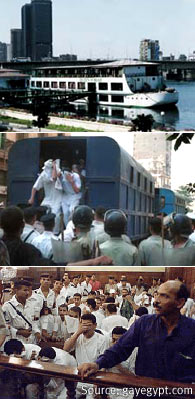The controversial trial of 52 suspected homosexual men arrested at Queen Boat, a gay disco on the Nile resumed in Cairo on Wednesday, reports Reuters. The Egyptian state security court heard arguments about 900 photographs which prosecutors say depict the men in indecent positions. Some of the photographs are believed to have been seized from the defendants? homes.

From the top: Queen Boat where the men were arrested, the men being transported to court, defendants in the courtroom
However, international human rights groups including Amnesty International believes all of the men, who are believed to be mostly in their 20s, are being held solely on the grounds of their sexual orientation.
"If people are detained solely on account of their sexual orientation, Amnesty International would consider them prisoners of conscience and call for their immediate and unconditional release," read a statement issued by the organisation.
According to a press statement by Al-Fatiha, the ?Egyptian government had flatly denied that the men have been arrested because of their sexual orientation and continues to say that they were engaged in public sex acts which are considered immoral by Egyptian society and are criminalized through Egyptian laws.?
Al-Fatiha responsible for launching an international campaign involving dozens of human and gay rights organizations in late July 2001 to bring worldwide attention on Egypt and the on-going trial in Cairo had unsuccessfully demanded the immediate and unconditional release of the men.
The gay Muslim organisation has renewed their call to action by asking people around the world to once again flood the Egyptian embassies and consulates with emails, faxes, and phone calls to put pressure on the government.
During the last session, human and gay rights campaigners held concurrent demonstrations on August 15 in ten cities including United Nations buildings in Geneva and outside the Egyptian Embassy's Cultural and Educational Bureau in Washington.
Although the law does not expressly prohibit homosexuality, the subject is taboo in the conservative and deeply religious country. There is hardly any public sympathy for the defendants. Local newspapers have published the names of the accused with their full addresses and occupations. Most of Egypt's most prominent human rights groups have ignored the trial saying in effect that "crimes" committed by homosexuals were of no concern to them.
The case has also generated international media and governmental attention. Observers from US, Canadian, Belgian, Danish and Swiss embassies attended Wednesday's trial. A Canadian diplomat and lawyer, Jean-Philippe Cachian, told Agence France-Presse "we were sent by our embassies as observers, but (came) without invitation."











 列印版本
列印版本










讀者回應
搶先發表第一個回應吧!
請先登入再使用此功能。